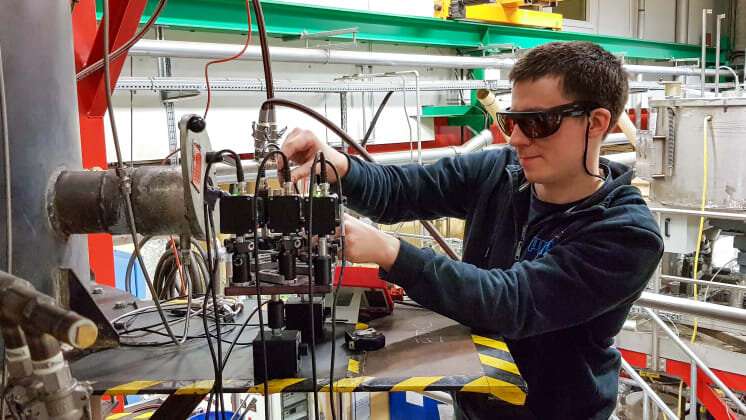
Emil Thorin from Umeå University has developed a new optical method for rapid measurements of gaseous inorganic species in biomass combustion and gasification. The new technology will contribute to more efficient conversion of biomass into renewable energy.
Thermal conversion processes, such as combustion and gasification, are used worldwide to generate heat, electricity and chemicals. In the quest for a renewable, circular energy system with a reduced carbon footprint, agricultural and forestry rest products are a promising alternative to fossil fuels. But one of the challenges with biomass is the high content and subsequent release of inorganic species, for example potassium, which leads to operational problems and expensive plant shutdowns.
To overcome this challenge, Emil Thorin, a doctoral student at the Department of Applied Physics and Electronics, developed a versatile technique that can be used to detect the most important potassium compounds simultaneously and directly in the high-temperature process under different experimental conditions.
“For example, in small flames in our laboratory, but also in larger reactors of several meters in length that are representative of industrial facilities. The novel technique is currently the fastest and most sensitive method for quantification of gaseous potassium species and has provided unique experimental data,” says Emil Thorin.
The new technique uses laser spectroscopy and can provide insight into the reactions involving potassium compounds on a nanosecond time scale.
“We hope that our work will contribute to a deeper understanding of thermal biomass conversion and lead to improved numerical models, process monitoring and control. This will increase fuel flexibility and promote more sustainable energy production,” says Emil Thorin.
Emil Thorin’s research shows that combustion is relatively well understood, whereas more work is needed regarding the gasification process, where the supply of oxygen is limited. The research has also shown that the method can be used to quantitatively image the potassium compounds in flames, which can lead to better insight into the reactions.
Emil Thorin’s work paves the way for more sustainable and efficient conversion of biomass to renewable energy, while providing increased knowledge of complex chemical processes.
More information:
Study: Numerical study and experimental verification of biomass conversion and potassium release in a 140 kW entrained flow gasifier
Citation:
Laser spectroscopy for more efficient biomass combustion (2023, May 17)
retrieved 17 May 2023
from https://techxplore.com/news/2023-05-laser-spectroscopy-efficient-biomass-combustion.html
This document is subject to copyright. Apart from any fair dealing for the purpose of private study or research, no
part may be reproduced without the written permission. The content is provided for information purposes only.
Stay connected with us on social media platform for instant update click here to join our Twitter, & Facebook
We are now on Telegram. Click here to join our channel (@TechiUpdate) and stay updated with the latest Technology headlines.
For all the latest Technology News Click Here
For the latest news and updates, follow us on Google News.
